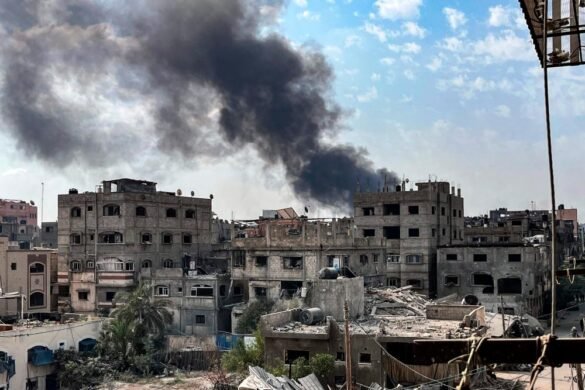The conflict in the Middle East escalated on Friday as Beirut was bombarded by Israeli forces, rejecting all hopes of a ceasefire in the ongoing hostilities. This surge in military activity comes amid U.S.-led diplomatic efforts to negotiate a truce between Israel and its adversaries, Hamas and Hezbollah. The latest round of attacks, marked by airstrikes on Beirut’s southern suburbs, dashed any remaining optimism for a swift end to violence that has gripped the region.
Recent Escalations in Beirut
Beirut’s southern suburbs faced a fresh wave of Israeli airstrikes early Friday, with at least ten strikes targeting the area, a known stronghold for Hezbollah. This was the first bombardment in nearly a week, with local journalists reporting widespread destruction. Following Israel’s issuance of evacuation orders for ten neighborhoods within Beirut, citizens were left to grapple with the aftermath of the strikes. Witnesses reported severe damage to infrastructure and voiced frustration over what they described as relentless and indiscriminate attacks.
Lebanese citizens, including Beirut resident Hassan Saad, condemned the Israeli force for its assault on densely populated neighborhoods, calling the situation a “brutal war” and accusing Israel of disregarding “laws or human morality.” Another local resident, Ali Ramadan, interpreted the airstrikes as a tactic by Israel to apply pressure on Lebanon amid ceasefire negotiations.

The Broader Impact of Israeli Force on Gaza and Lebanon
In parallel to the bombardment in Beirut, Israeli airstrikes targeted multiple locations in Gaza, resulting in the deaths of at least 68 people, according to local medical sources. Gaza’s central areas, including the cities of Deir Al-Balah and Al-Zawayda, witnessed extensive bombing, which also caused damage to schools and camps for displaced people. The latest attacks in Gaza and Beirut have raised significant concerns from the United Nations and humanitarian agencies, which have warned of an “apocalyptic” crisis in Gaza.
The Israeli government cited national security as the primary motivation for these operations, with Prime Minister Benjamin Netanyahu emphasizing that the nation’s safety remains the top priority “despite any pressure or constraints.” Netanyahu reportedly conveyed this stance to U.S. envoys attempting to mediate a ceasefire. His refusal to entertain a ceasefire has been echoed in statements from senior Israeli officials, who insist on continuing their operations until security is ensured.
U.S. Mediation Efforts Fall Short Amid Renewed Bombardments
Despite the diplomatic efforts of U.S. Secretary of State Antony Blinken and other U.S. envoys, including Brett McGurk, to broker a temporary ceasefire, Israel’s actions in Beirut and Gaza reveal deep-seated resistance to ending military operations. U.S. officials have been actively engaged in discussions with Israel and Lebanon, advocating for a de-escalation of hostilities. However, according to statements from Lebanon’s caretaker Prime Minister Najib Mikati, Israel has remained “stubborn” and unwilling to accept proposed solutions for a ceasefire.
Lebanon’s health ministry has reported extensive casualties, with at least 52 people killed in Israeli strikes targeting over a dozen towns in the Baalbek region, which holds significant cultural heritage sites. Additionally, an Israeli airstrike near the Syrian-Lebanese border on Friday forced the temporary shutdown of a border crossing that had only recently reopened after previous attacks. Lebanese officials, including Transport Minister Ali Hamieh, confirmed that these strikes have further strained Lebanon’s critical infrastructure.
Hezbollah’s Role and Response
Hezbollah, which has fired rockets into Israel in support of Gaza’s Palestinians, has maintained a prominent role in the ongoing conflict since early October. Hezbollah’s involvement escalated following a large-scale attack on Israel by Hamas-led militants on October 7, resulting in substantial Israeli casualties and numerous hostages. The hostilities have since intensified, with Hezbollah’s operations against Israel becoming a key point of contention in any potential ceasefire negotiations.
Israel’s forceful responses, including the recent strikes in Beirut and across Gaza, have led to a staggering death toll of over 43,000 Palestinians, with significant portions of Gaza left in ruins. Lebanon has also sustained heavy losses, with its health ministry recording at least 2,897 deaths from Israeli strikes, marking one of the most severe escalations in the region in recent years.
Obstacles to a Ceasefire and the Path Forward
The prospects for peace appear bleak as Beirut bombarded by Israeli force rejecting all hopes of ceasefire, faces continued military pressure. A truce, initially suggested in part by U.S. diplomatic efforts, has been complicated by Hamas’s stated refusal to accept temporary ceasefire terms that do not fulfill demands for the withdrawal of Israeli troops from Gaza and the lifting of blockades. Hamas officials have reiterated their stance that any lasting peace agreement must address these longstanding issues, including security for Palestinians and the right to return for displaced residents.
The U.N. and international observers have urged all parties to consider the dire humanitarian consequences of continued violence, but the path to a ceasefire remains fraught with challenges. As Israeli forces maintain their offensives in Beirut and Gaza, the possibility of a truce before the upcoming U.S. presidential election appears unlikely.
As Beirut bombarded by Israeli force rejecting all hopes of ceasefire, the international community faces mounting pressure to find a resolution to the violence. With local populations suffering severe losses and infrastructure collapsing, the need for a sustainable, peaceful solution has become more pressing than ever. However, given the resistance from involved parties and the current escalation in hostilities, the outlook for peace remains uncertain.
Stay connected to know more on arcnews.online for global news like Beirut Bombarded by Israeli Force, Rejecting All Hopes of Ceasefire. For videos updates visit our YouTube. Do subscribe to Arcnews to get latest updates directly in your mail box.
Have A Great Day.


